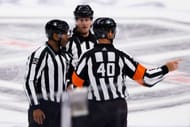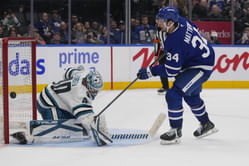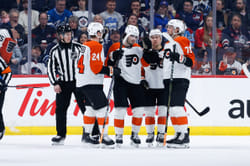
In ice hockey, officials play a crucial role in upholding the game's regulations and ensuring fair play. These on-ice authorities, recognizable by their traditional black and white striped shirts, oversee the proceedings during matches. Within the National Hockey League (NHL), each game features a quartet of on-ice-officials—two referees and two linemen.
Referees, distinguishable by their red or orange armbands, hold the pivotal duty of overseeing the game's flow, adjudicating penalties, and orchestrating face-offs at the commencement of periods and following goals. Meanwhile, linesmen take charge of face-offs during stoppages for reasons other than goals, with their main focus on enforcing violations related to the centre line and blue lines, such as icing and offside infractions.
NHL Referees Salary
NHL referees receive varying salaries based on their years of service and their specific roles as referees or linesmen. The current collective bargaining agreement outlines the salary structure, with referees earning between $220,602 (Year 1) to $482,226 (16+ years) for preseason and regular season games, while linesmen make between $141,291 (Year 1) and $292,027 (20+ years). Additionally, officials selected for playoff games can earn extra compensation per round, with referees receiving $27,000 and linesmen receiving $17,250. Standby referees and linesmen for the Conference Finals and Stanley Cup Finals also receive compensation, with standby referees earning $1,000 per game and linesmen earning $650 per game.
Longest-tenured/Highest-Paid Officials in the NHL
The NHL boasts a lineup of seasoned officials who have not only earned their stripes but also hefty paychecks. Topping the list of the longest-tenured and highest-paid referees are stalwarts like Kevin Pollock, whose illustrious career span more than 1,488 games since 2000. Following closely behind is Marc Joannette, with more than 1,452 games officiated since 1999, and Kelly Sutherland, who has overseen more than 1,389 games since 2000. Their contributions to the game are not only reflected in their longevity but also their pivotal roles in ensuring fair play and upholding the integrity of NHL matches.
FAQ's On NHL referees Salary
A. NHL referees' salaries vary based on experience and role. Referees can earn between $220,602 (Year 1) to $482,226 (16+ years) for preseason and regular season games, while linesmen make between $141,291 (Year 1) and $292,027 (20+ years). Playoff officials also receive extra compensation per round.
A. Leading the pack of NHL officials with extensive experience and significant earnings are stalwarts like Kevin Pollock, Marc Joannette, and Kelly Sutherland. These referees have officiated over a thousand games each since the late 1990s/early 2000s.
A. The Hockey Hall of Fame pays tribute to iconic officials who have made lasting contributions to the sport. Inductees include notable figures like Chaucer Elliott, Mickey Ion, and Cooper Smeaton, as well as modern legends like Ray Scapinello and Bill McCreary.
A. NHL referees and linesmen selected for playoff games receive additional compensation per round. Referees earn $27,000, while linesmen receive $17,250. Standby officials for the Conference Finals and Stanley Cup Finals also receive compensation per game.
A. NHL referees oversee the flow of the game, enforce penalties, and conduct face-offs at the beginning of periods and after goals. Linesmen, on the other hand, focus on enforcing violations related to the center line and blue lines, such as icing and offside infractions, and conduct face-offs during other stoppages in play.









